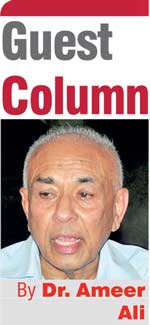Friday Feb 20, 2026
Friday Feb 20, 2026
Saturday, 12 November 2022 00:07 - - {{hitsCtrl.values.hits}}

Super ministry?
President Ranil Wickremesinghe has taken control of four different ministries in addition to defence. Ministry of Finance, Economic Stabilisation and National Policies; Ministry of Technology; Ministry of Women, Child Affairs and Social Environment; and the Ministry of Investment and Promotion have fallen under his direction. In other words, he has created a mega or super ministry expecting the state ministers to assist him. The rationale behind this super control is not clear. It may be a simple exercise of power grabbing hoping to end up as an autocrat, or, reflection of the dearth of talent in his team and loss of confidence in the ministers. However, if things go wrong the state ministers could easily shift the blame onto the President.
The popular view within the international community, including IMF, is that the Government of Sri Lanka is incorrigibly corrupt, that the same gang of leaders who led the country to bankruptcy are still in control of power through the parliament and that RW has only a limited space to act independently and make a difference. Thus, given the limited time left for his presidency before going to the polls, he is forced to make a difference not only to impress international observers but also to increase his own popularity at home. That in fact seems to be the explanation to engage in this exercise.
His predecessor Gotabaya Rajapaksa (GR), without formally taking control of other ministries, did interfere willy-nilly in their businesses, which ultimately created a Gautocracy and ended in disaster. Whether RW’s experiment, with instructions to the tri-forces and police to take decisive action to control any opposition and maintain public peace, would lead to a Ranilocracy and meet the same fate as the previous one, only time would tell. At least GR had a viyathmaga to shift the blame, but unfortunately RW has none of it.
|
President Ranil Wickremesinghe
|
Initiative for ethnic reconciliation
Ethnic reconciliation is no doubt a precondition for any political and economic stability and development of the country. However, it needs to be pointed out that ethnic estrangement in Sri Lanka did not happen spontaneously, but was a deliberately designed strategy by Sinhala nationalists to hijack democracy and capture political power and convert the island into a Sinhala Buddhist nation state with guest status to all ethnic and religious minorities.
A series of communal riots and a civil war all supported by the State went to demonstrate that these nationalists carry short memories illustrating George Santayans’s maxim, “those who cannot remember the past are condemned to repeat it”. To counter the ethnonationalism of the majority, minorities also devised their own varieties. In short, inter-ethnic animosity and communal hatred is part of Sri Lanka’s political pathology. The economic cost of this estrangement is what the country is experiencing now.
What is worse is that this ethnic convulsion has created a second Sri Lanka that exists outside the first. It is a Sri Lanka of diasporic elements with no fixed territory but advancing steadily in number with economic strength and ability to influence international opinion to bring pressure upon governments in Sri Lanka. The pressures that the country faced in recent past and facing now from various world agencies like UNHRC and regional groups like EU and QUAD are indeed a reflection of the growing power of diasporic Sri Lanka. This Sri Lanka is not like LTTE’s Eelam, which wanted to divide the country, but one that wants the mother country original to grow, develop and prosper, not as an ethnic majoritarian enclave but a secular democracy, treating every one of its citizens equally, endowing them with the same rights and obligations. The willingness of the diasporic community to invest in the mother country and help through various charitable projects is testimony to its noble intentions. Under these circumstances the ethnic issue demands urgent attention with honesty in dealing with its resolution.
However, RW’s initiative to appoint a foursome committee, with two of its members representing the Tamil and Muslim communities, as a preliminary step towards drawing up a multi-pronged agendas for reconciliation should be welcomed, but with serious reservation. To start with, this initiative is the result of relentless pressures from outside and future international economic assistance and support to the country is tied to the resolution of this issue. Yet, the reason for the reservation arises from doubting the President’s courage to take a decisive stand on the ideology that lies at the bottom of ethnic estrangement. That ideology, propounded by ethnonationalist Sinhala politicians, academics, intellectuals and opinion makers believe as indicated earlier that the country belongs only to Sinhala Buddhists and that all minorities are their long-term guests.
That claim was publicly expressed in no uncertain terms in Kandy on 7 July 2019 by that obstreperous Buddhist monk Ven. Gnanasara. The only Sinhalese Buddhist politician/statesman to repudiate that claim was the late Mangala Samaraweera. How he was chastised for challenging that ideology and made a pariah by a section of post-Cold War Buddhist monks is all history. Will RW rise to the occasion now and be a Samaraweera? That will be his Litmus Test to prove that he is genuinely interested in resolving the ethnic issue.
Genuine reconciliation cannot eventuate unless that pernicious ideology is erased from Sri Lanka’s political dictionary. Until that happens, whatever the program or reforms proposed by the new committee would be a waste of time, and should be considered as RW’s trick to cheat the international community.
(The writer is attached to Murdoch Business School, Murdoch University, Western Australia.)